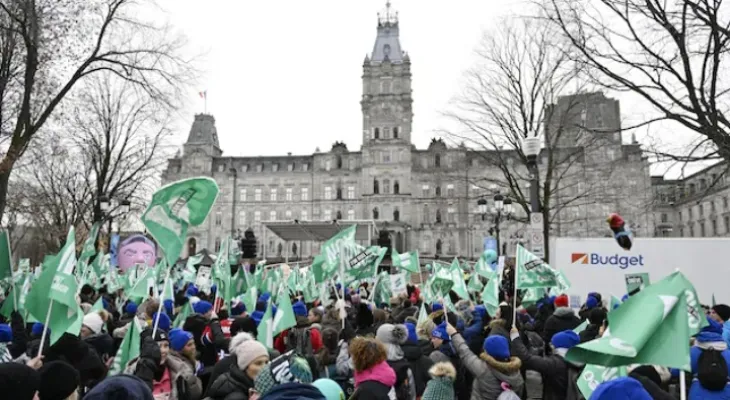Search here
Newspaper
Search here

Arab Canada News
News

Published: November 28, 2023
The Joint Front announced, in a notice sent to the unions affiliated with it on Tuesday, organizing seven new days of strike, from December 8 to 14, hoping to reach an agreement to renew collective agreements before the holiday.
In the notice sent to its members, the Joint Front, which represents 420,000 workers affiliated with the public sector, warns that these seven strike days will be the last warning before an indefinite general strike if the situation does not improve at the negotiation table.
These seven days of strike will be added to the strike on November 6 and the three days from last week.
The document stated that "the goal of this last sequence before launching an indefinite general strike is to reach an agreement before the holiday."
At the same time, thousands of citizens and families will once again experience changes in their daily lives or delays in care and services as a result of the strike.
Union members of the Joint Front, most of whom are from the health, education, and social services sectors, have been negotiating for about a year to renew their collective agreements, which expired on March 31. Quebec's Minister of Labor, Jean Boulet, appointed a mediator last week, at the request of the Joint Front, to try to bring both parties back to the negotiating table.
FIQ also plans to add strike days.
The union organization FIQ (Health Union Professionals in Quebec) also plans to announce new strike days on Wednesday. As with the Joint Front, FIQ must notify the government seven days in advance before returning to strike.
FIQ-affiliated workers, who number 80,000 and are also negotiating to renew their work contracts, had struck on November 8 and 9.
But currently, there is no option to choose an indefinite strike, as 66,000 members of the Independent Federation of Education, whose members started a general strike last Thursday, have done.
Salaries and work organization, especially in the fields of education and health, are the most prominent points of disagreement between the government and union members.
The Treasury Board president, Sonia Lebel, who leads the negotiations on behalf of the government, appeared optimistic on Sunday during the broadcast of Quebec's program Tout le monde en parle.
The minister, who says she is asking unions for more flexibility to solve serious employee problems undermining the health and education sectors, said she is confident in finding a way out and reaching fair and equitable wage terms for all workers. She pointed out that teachers, in particular, have already benefited from increases of up to 15% in the last round of negotiations.
Comments